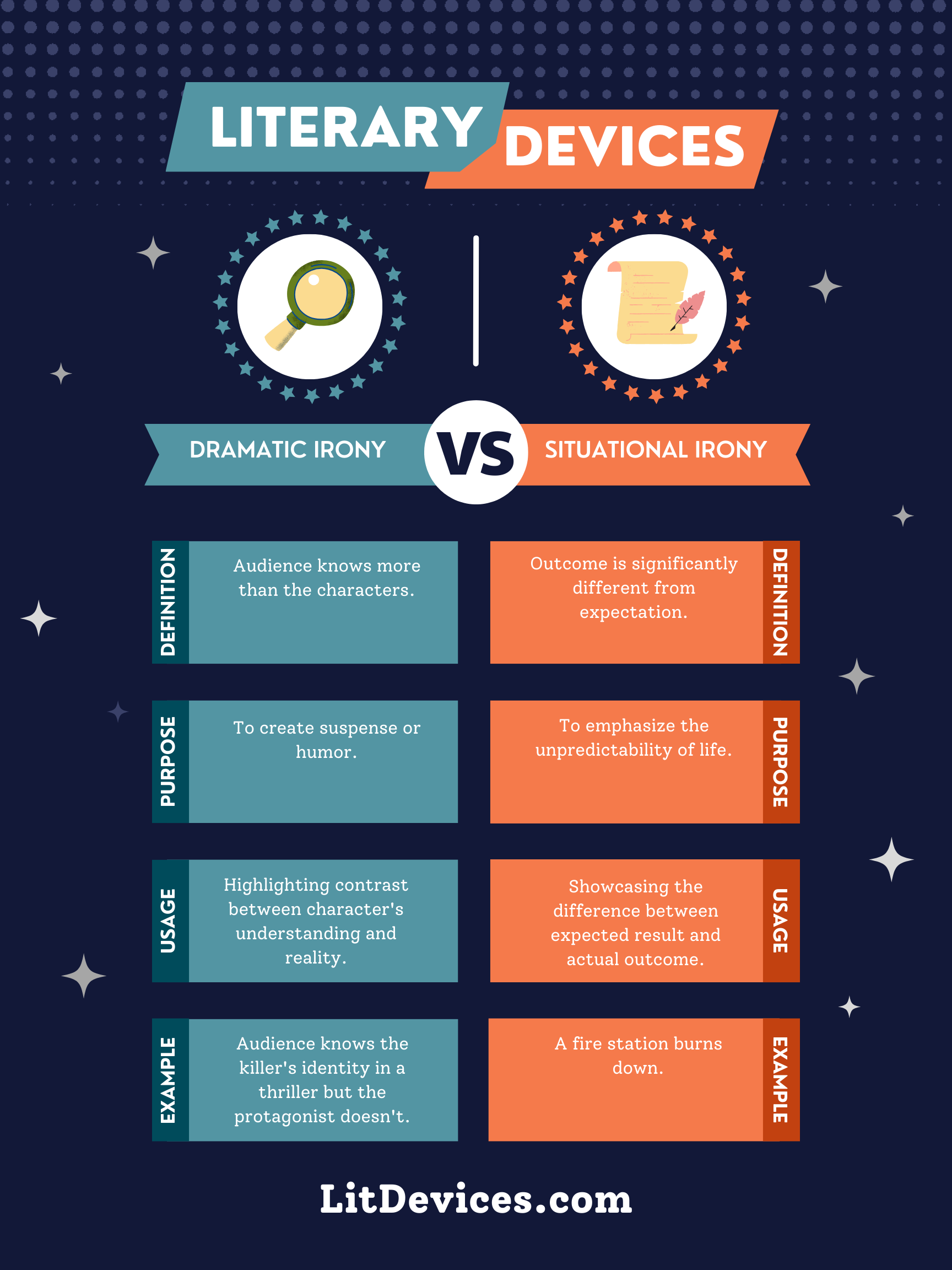Dramatic Irony occurs when the audience knows something characters do not; Situational Irony is when the opposite of what’s expected happens.
Dramatic Irony
Dramatic irony is a literary technique used when the audience or reader has more information about the circumstances or future events in a story than the characters within it. This discrepancy creates tension, anticipation, or humor.
🎭 Example: In Shakespeare’s “Romeo and Juliet,” the audience knows that Juliet is not dead when Romeo finds her in the tomb, leading to tragic irony as he takes his own life.
Situational Irony
Situational irony occurs when there is a stark contrast between what is expected to happen and what actually occurs, often leading to a surprising or humorous outcome.
🔄 Example: In O. Henry’s “The Gift of the Magi,” a young couple sells their most prized possessions to buy each other Christmas gifts, only to find the gifts useless without the possessions they sold.
Summary
| Literary Device | Definition | Purpose | Usage | Relevant Examples |
|---|---|---|---|---|
| Dramatic Irony | The audience knows something that the characters do not. | To create suspense, humor, or dramatic tension. | Often used in tragedies, mysteries, and comedies. | Romeo’s reaction to Juliet’s “death” in “Romeo and Juliet.” |
| Situational Irony | An unexpected outcome, contrary to what was initially anticipated. | To provoke thought, entertain, or highlight the absurdity of circumstances. | Common in short stories, novels, and comedic situations. | The outcome in “The Gift of the Magi” by O. Henry. |
Writing Tips
When incorporating dramatic irony or situational irony into your work:
- For Dramatic Irony: Build your narrative in a way that reveals key pieces of information to the audience ahead of the characters. Use this technique to enhance emotional engagement and anticipation.
- For Situational Irony: Set up expectations through your story’s context or character dialogues. Then, deliver an outcome that flips these expectations on their head, ensuring it is still believable within the story’s world.
🖋 Example for Dramatic Irony: Create a scenario where the protagonist is unaware of a significant truth that the reader knows, such as being adopted, which influences their decisions and the audience’s response to those decisions.
🖋 Example for Situational Irony: Write a story about a thief who meticulously plans a heist to steal a valuable artifact, only to discover it’s a replica, and the real one was never there.
FAQs
Can a story contain both dramatic and situational irony?
Yes, many stories utilize both forms of irony to enrich the narrative and engage the audience on multiple levels.
Is one form of irony superior to the other?
Neither is superior; their effectiveness depends on the context of the story and what the writer aims to achieve.
How can I make situational irony feel natural and not forced?
Ensure that the ironic situation arises logically from the story’s circumstances and character actions, avoiding contrivance by laying subtle groundwork for the twist.
Exercise
Determine whether the following scenarios are examples of dramatic irony or situational irony:
- A detective is searching for a notorious criminal, not knowing the criminal is his new, seemingly friendly neighbor.
- A professional ice sculptor moves to a tropical island to find inspiration, only to discover ice melts too quickly to sculpt.
- In a horror movie, the audience knows the killer is hiding in the basement, but the protagonist decides to hide there, thinking it’s safe.
- A man avoids flying due to fear of crashes and drives instead, but gets into a car accident on the way to the airport.
Answers:
- Dramatic Irony
- Situational Irony
- Dramatic Irony
- Situational Irony
Interesting Literary Device Comparisons
- Metaphor vs. Simile: While both are figurative language used to make comparisons, metaphors imply a direct comparison without using “like” or “as,” whereas similes use these words explicitly.
- Foreshadowing vs. Red Herring: Foreshadowing is a clue hinting at future events in

